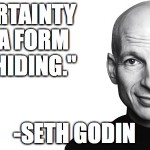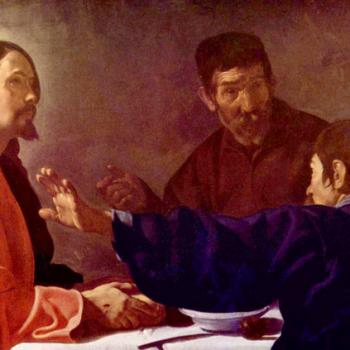Change is terrifying. It is unsettling. It is anxiety inducing.
But we can handle all that.
The real challenge for us to overcome is this: we too often operate with the idea that change is a sign of weakness and failure. In fact, however, change can often be a sign of strength and, even, love.
The Danger of Love
C. S. Lewis issued this warning to all who seek comfort and security and stability above all else:
The only place outside Heaven where you can be perfectly safe from all the dangers and perturbations of love is Hell. (The Four Loves, 121)

To be in a relationship of love is to risk being changed. In fact, to be in a relationship of love is to be changed. If we are not changed by love then we are not in a relationship of love at all. We are merely exerting our affections on another person–often in hopes of changing them.
To love is to be changed, and conversely to be changed is to have given ourselves to someone else is an act of love or else to have been a victim of violence. We have entrusted ourselves to their story, seen the world through their eyes, been transformed by their presence. Or else we have been manipulated or subjected by the other person’s power.
Becoming a Journeying People
The language of “journey” is all the rage these days. When the minister invites us to communion, he graciously tells people not to do anything that would feel inauthentic to where they are on their faith journey.
We are people in movement. We are people in flux. You can’t step into the same ego twice.
And yet as we sit in the peanut gallery, making jokes about what’s unfolding on stage in front of us like the grumpy old men in the Muppets, we too often critique and criticize change as though it were a sign of weakness or dishonesty.
Must we always be cynical, or could it be that a politician has changed her mind because she has learned and grown?
Was that pastor on some “slippery slope” that we should all avoid? Did he show us where the edge was from which we need to slowly back away? Or was he drawn down that slope as he held hands with someone who opened his eyes to a world toward which we should all yearn to slide?
Being Like Jesus
If you’re looking for great moments in the Gospels here’s a pro tip: look for the unnamed women. Almost without exception these brief candles spend their hour upon the stage without strutting or fretting, showing us what faithful engagement with Jesus entails. Poor players who are rich beyond measure.
In one such appearance, Jesus himself is changed. Love overcomes his understanding. Change explodes his understanding of his limited vision.
As Matthew tells the story, when a Canaanite woman comes up to Jesus asking for an exorcism for her daughter, Jesus rebuffs her. “I was sent only to the lost sheep of the house of Israel.” “It is not proper to take the children’s bread and throw it to the dogs.”
Ok, so she’s a dog. And she’s a Canaanite. (FYI: nobody was a Canaanite in the first century–Matthew calls her this to associate her with the people of the land whom God was supposed to exterminate and/or enslave to Israel so that Israel could have its land flowing with milk and honey and wine and bread.)
But she knows something about Jesus. About the Jesus whose mission had already left the children fully fed with twelve basketfuls remaining: there was plenty. Plenty for her. Plenty for the people of the land. Plenty for the dogs.
“Even the dogs eat the crumbs that fall from the master’s (Lord’s?) table.”
“Oh woman, great is your faith! May it be for you as you wish.”
An encounter. A relationship established ever so briefly. She, to be sure, has her life changed by Jesus’ power. And he, for his part, had his vision changed by the Canaanite woman’s humility.
And I would also suggest that it takes more strength to change, to concede, to back down, to be reestablished on the way of boundless love, than it does to hunker down with a tough denunciation and strict delineation of who does and who does not belong.
Being Like God
Christians have put the God puzzle together in Trinitarian terms: God is Father, Son, and Holy Spirit.
Christians have put the Jesus puzzle together in God-man terms: Jesus is two distinct natures in one person.
To sharpen that last point, the catechism I once memorized says that Jesus is “two distinct natures and one person, forever.”
Forever. Christ is the God-man. This means that God has changed. Dramatically and eternally.
The only place outside of heaven free of the dangers and perturbations of love is hell. And God chose the dangers and perturbations of loving humanity. This has changed God.
The power of the incarnation is the power of weakness, the power of transformation, the power of change.
The Power of Change
On Seth Godin’s blog today he promotes a new book by Al Pittampalli, Persuadable, which he summarizes like this:
A practical guide to help us understand that people who change their minds are actually the most likely to change the world
There is a missionary zeal in many converts. People who embrace a new faith. People who become Calvinists (kyrie eleison). Catholics who become Protestant. Protestants who become Catholic. Carnivores who become vegetarians. Suburbanites who embrace the lure of the City.
The have had the strength to embrace something new. They have given themselves to the words and vision of someone else. They have taken an unexpected turn in their journey.
There is something secure about staying put. Something comforting about not leaving home. Something reassuring about keeping ourselves surrounded by the same people and beliefs.
But maybe, just maybe, our comfort is a sign that change is overdue.
Maybe it’s time to ask, again, what might happen if I love my neighbor as myself?
<em>Image © Nana B. Agye, Flickr, Creative Commons












